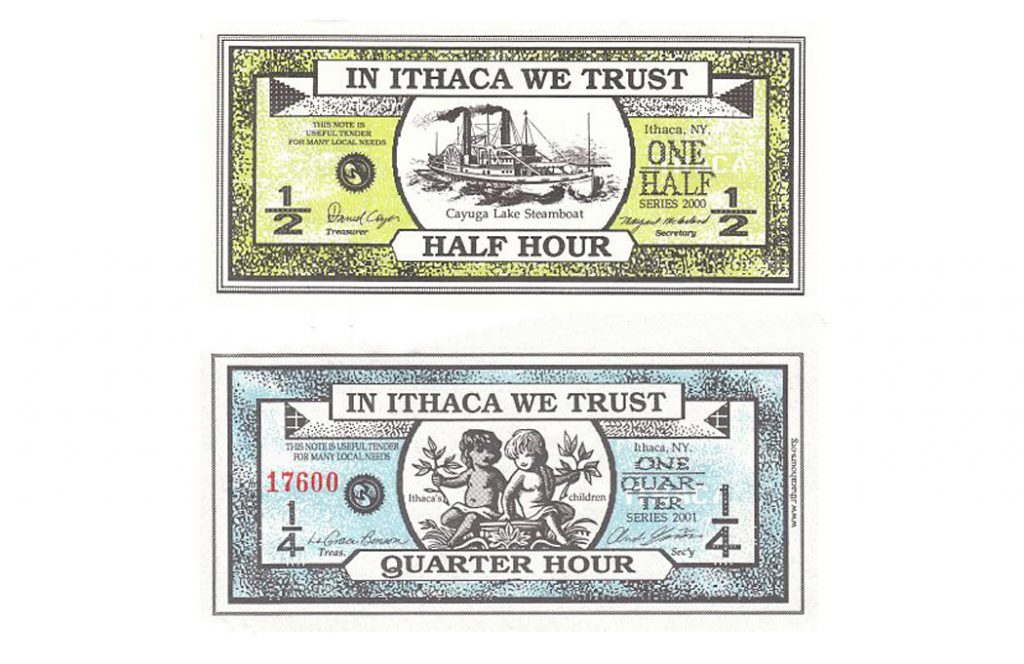
As mentioned in last month’s article, the U.S. produces $21 trillion annually in gross domestic product (GDP). Despite being surrounded by abundance, however, millions still lack reliable access to basic human needs. Our economy—and more specifically, our monetary system—is failing us. The reason? The very invention of money was born from a world view of scarcity, not surplus.
Money is a tool, created out of a need to distribute scarce resources. For hundreds of years, high-quality food, clothing, healthcare, and education were in short supply due to the high cost of providing them. But our world has changed. Today, surplus is all around us: restaurants and movie theaters with empty seats, university classrooms that are dormant, food that goes unsold, houses that remain vacant. Our current scarcity-based monetary system cannot distribute these resources effectively—if it could, we would not have this surplus to begin with. Similarly, there are countless people who want to enjoy these resources but cannot afford to do so. We need a new kind of money that distributes surplus goods and services, especially to the most underprivileged individuals in society.
Joel Hodroff, the founder of DualCurrency Systems, has found an effective solution. Last year Hodroff published a paper suggesting that cities adopt their own volunteer-based currencies, not as a replacement to the dollar but as a complement. Here’s how it works: a local volunteer center keeps an updated list of community-enhancing jobs, such as beautification projects, senior care services, mural painting, and school tutoring. Individuals can take on these tasks to earn a secondary currency (let’s call them “merits”), which can be redeemed for discounts with cash purchases at local businesses. While Hodroff’s idea is simple, it can create considerable benefits for all parties involved.
One community-currency example is the “Ithaca HOUR” in Ithaca, New York, which has been operating successfully since 1991. Several million dollars’ worth of “HOURS” have been traded over the years, helping to keep wealth local and supporting community development.
Benefits to the Individual
Let’s examine the benefits of a dual currency system, starting with the individual. First off, it provides flexible and consistent employment, as there is no end to the need for city improvements. Second, this system can lower the cost of living, freeing up money that can be spent elsewhere.
For example, if you buy a $2 sandwich for $1 and 1 merit, you just saved a dollar to spend on other needs. The sandwich vendor will gladly make this sale so long as they generate enough profit to cover the costs of making a sandwich. This allows underemployed individuals the ability to purchase more goods and services while also contributing dignified and meaningful work to their community.
Benefits to Businesses
Let’s imagine the following simplified scenario to see how a dual currency system also benefits local businesses. Say the Sondheim Center has empty seats for an evening performance. Regular patrons feel comfortable paying the current price of tickets, but management knows that there are many who find the cost prohibitive. Is there a way to selectively lower a ticket price for those who cannot afford it, while keeping it high for regular patrons? This would provide three major benefits: more people could afford to see shows, the theater could increase its profits, and the surplus capacity of the theater doesn’t go to waste. This practice is called dynamic pricing. A dual currency system makes it possible by allowing those with merits a supplementary way to pay. Businesses can tap into a larger share of the community that would otherwise not buy their goods and services.
Benefits for the City & the World
When we look at a larger scale, we can see the benefits for cities and even the entire country. A volunteer-based community currency not only encourages volunteerism but also keeps wealth in the neighborhood, helping local economies thrive. By generating an independent source of new wealth, communities become more resilient to global financial crises by providing a constant stream of employment.
Finally, on a global scale, dual currencies can help us conserve natural resources by putting surplus goods to use. Our present model tends to prioritize wasteful consumerism and growth at all costs.
Reinventing Money
Money, just like any other invention, can be redesigned to better fit our needs. A volunteer-based dual currency would not fix all of our problems, but it presents a bottom-up solution to several consequences of capitalism, such as financial crises, income inequality, and unstable employment. Imagine a world with more connected and thriving communities, democratized employment opportunities, and support for those in need. By redesigning currency, this can be realized.
Fundamentally, to rethink currency is to rethink our lives, our values, and the very future of our world.
